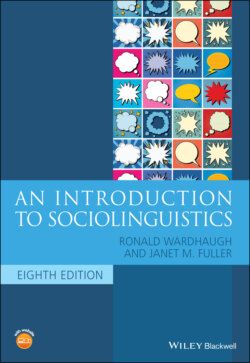Читать книгу An Introduction to Sociolinguistics - Ronald Wardhaugh, Janet M. Fuller - Страница 55
Ethnic dialects
ОглавлениеSo‐called ethnic dialects do not arise because members of particular ethnic groups are somehow destined to speak in certain ways; like all other social dialects, ethnic dialects are learned by exposure and anyone, regardless of their ethnic identification or racial categorization, might speak in ways identified as ‘African American Vernacular English’ or ‘Latinx English.’ The connection between race/ethnicity/nationality and linguistic variety is one that is entirely socially constructed, thus these varieties would perhaps best be described as ‘ethnicized.’
The processes that create ethnic dialects are not well understood, and much research remains to be done into how and why they develop. However, we do know that ethnic dialects are not simply foreign accents of the majority language; many of their speakers may well be monolingual in the majority language. Latinx English, for example, is not English with a Spanish accent and grammatical transfer, as many of its speakers are English monolinguals. Ethnic dialects are ingroup ways of speaking the majority language.
One study which gives us insights into the motivations for the development of an ethnic dialect was done by Kopp (1999) on Pennsylvania German English, that is, the English spoken among speakers of what is commonly called ‘Pennsylvania Dutch,’ which is a German dialect which developed in certain regions of Pennsylvania. Kopp analyzes a variety of features associated with speakers of Pennsylvania German in both sectarian (i.e., Amish and Mennonite) and nonsectarian communities. He discovers what at first seems to be a paradoxical pattern: although the sectarians are more isolated from mainstream society, and they continue to speak Pennsylvania German, their English has fewer phonological features that identify them as Pennsylvania German speakers than the nonsectarians, who are integrated into the English mainstream and less likely to be speakers of Pennsylvania German. So the nonsectarians, who are in many cases English monolinguals, exhibit more phonological features reminiscent of a Pennsylvania German accent in their spoken English than the sectarians! As Kopp explains, this makes perfect sense when we think of language as providing a way to construct identity. The sectarians speak Pennsylvania German, and thus can use that language to create group boundaries; the nonsectarians, who increasingly do not speak Pennsylvania German, have only their variety of English to use to construct themselves as members of a particular ethnic group.
Although Pennsylvania German English developed largely in rural areas, many ethnic dialects are urban phenomena. Cities are much more difficult to characterize linguistically than are rural hamlets; variation in language and patterns of change are much more obvious in cities, for example, in family structures, employment, and opportunities for social advancement or decline. Migration, both in and out of cities, is also usually a potent linguistic factor. Recent research on superdiversity focuses on this aspect of language contact and development and will be discussed further in chapter 10.
In research which examines the complexities of urban speech, Jaspers (2008) also addresses some of the ideological issues at stake in the study of ethnic dialects. He addresses the practice of naming particular ways of speaking as ethnolects, pointing out that it is indicative of the ideological positions of the sociolinguists doing the research themselves. Labeling and describing a particular way of speaking as an ethnic dialect implies a certain homogeneity about the variety and its speakers, and it inevitably also places the dialect and the group who speaks it outside the mainstream. Further, such labeled varieties are not always linguistically distinct, despite the perception of speakers. Jaspers writes (2008, 100):
The point is not that code‐establishment and naming as such should be frowned upon, but that they limit our understanding of inner‐city social and linguistic practices, and that they have ideological consequences sociolinguists should take into account. As an alternative, I have advocated that ethnolect be regarded as a useful term for speakers’ perceptions of particular ways of speaking (and of course, some scholars of ethnolects are already attending to perceptions of this kind), with the understanding that speakers’ perceptions, and the names they develop for them, do not necessarily correspond to systematic linguistic differences (and vice versa).
The following discussion of African American Vernacular English attempts to incorporate these disparate perspectives. In doing so, we seek to describe a fascinating linguistic phenomenon, the development and spread of a linguistic variety that is linked to a particular ethnic or racial group without contributing to essentialist ideas about social groups or making simplistic descriptions of languages.
